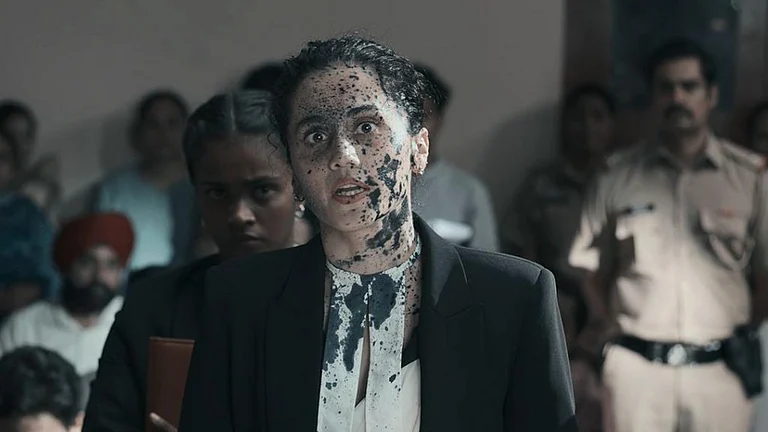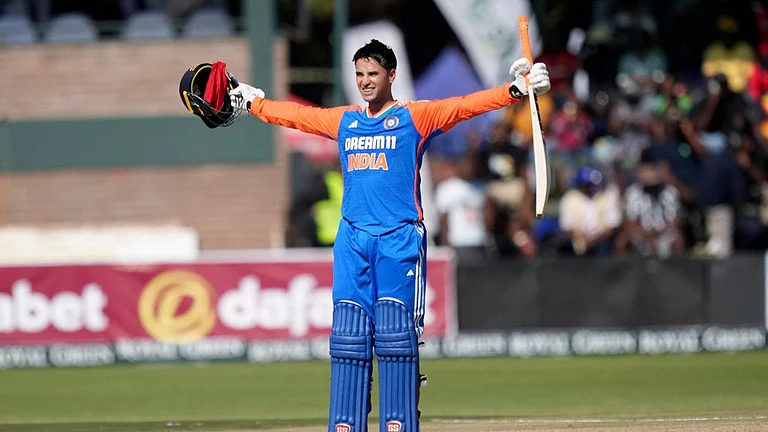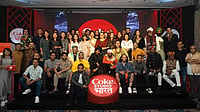From winning National Film Award at the age of 12 for Vishal Bhardwaj’s 2002 released film Makdee (2002) followed by acting in films like Iqbal (2005) The Tashkent Files (2019) Serious Men (Netflix 2020) Ray (Netflix 2021) Criminal Justice (produced by BBC studios India, 2022) Jubilee (Amazon Prime 2023), Shweta Basu Prasad’s journey in Bollywood from a child actor to young star was captivating and inspiring at the same time.
After making a documentary film on Indian classical music after college which premiered at the Kala Ghoda Arts Festival and was then on Netflix for 3 years, she is now ready with her first fiction direction titled ‘Retake’. It is produced by Applause Entertainment with Anupam Kher in the lead, along with Zarina Wahab and Danish Husain. Retake is the official selection for New York Indian Film Festival, where it will make its American premiere.
In this conversation with Outlook, Shweta talks about the film, the pros and cons of starting as a child actor, and how OTT has shaped her acting career.
Excerpts from the interview:
Q) Let's start by talking about 'Retake'. Don’t you think you did your fiction film too late? Why so?
Yes, I did make a documentary film about ten years ago called 'Roots' which was about the dying visibility of Indian classical music, and that was the interview-based documentary and direction was never on the cards. I made the documentary because of my pure love of classical music and I am a student of Hindustani classical music myself. I played the sitar and I have grown up in an environment at home where classical music, literature films, and art were always encouraged and always found a place for conversation so that documentary was the result of that mostly and I was just in college when I was working on it so I thought it was an important documentary to make but no I never thought of making fiction actually, I always had the flair for writing. I am more of a writer and I have always written poems, I have written short stories.
'Retake' story I wrote in 2018 and I narrated it to my mum she really liked it and said why don’t you direct it and I wasn’t sure because I have always been an actor so I never thought about it but in 2020 during the lockdown when I was at home and didn’t have anything to do, I started writing the screenplay and dialogues for retakes and since I worked with phantom films in 2015 as a script consultant, I used to read a lot of screenplays. I have a fair idea of drafting a screenplay so that’s how I wrote the screenplay for 'Retake' in 2020 I got a great response from the industry and I had producer friends who said that they would like to invest and that got me thinking and then Mr. Anupam Kher also loved it and he encouraged me so much and he really nudged me to sort of make it and go out and do it. During that time I was in talks with applause as well to collaborate as a writer, director, and producer. I was already working with them as an actor and they read the 'Retake' script and things just fell into place and I am so glad applause entertainment came on board.
Q) Why do you think 'Retake' was the right opportunity to get into fiction as a genre?
Ans) The story is actually about a 60-plus former actor who used to be an actor at one time who is being played by Anupam Kher. His character's name is Ramanand Gokhale and maybe because I am an actor so it's easier to write an actor’s story but more than that I wanted to write about a vulnerable man onscreen. As a female filmmaker and storyteller, it is important that I write stories that empower women onscreen but I think its equally important to emotionally empower men onscreen because men have that constant pressure of looking tough, acting tough, and being strong and being the provider, the father, the brother and in our movies, the hero, the savior. So I wanted to write about a man who lived his life doing all of that and now in his 60s is sort of reflective of what life was and questions his choices in life. Zarina Wahab ji is playing his ex-lover.
I think with fiction you can bend a lot of things, you have things more in control, and you can shoot according to what they're in the screenplay but since I am the writer and director of the film, I had the liberty to write the character and write the story the way I want to say so yeah that’s I think.
Q) You did some great projects on the ott platform, something that anyone as an actor would love to explore. Do you think that had this not been for the emergence of ott, you would have still struggled to find your place in the entertainment industry?
Absolutely, ott has given me a new lease as an actor and I owe my recent success as an actor to the ott platform. Because it's such a democratic platform, there is no small film or big film. It's out there and people can choose to watch a documentary, a Japanese anime, a Malayalam film or an Iranian film, a Bollywood blockbuster, or a Hollywood blockbuster so that's why it’s a very democratic platform and it’s the best time for writers, directors, and actors to make the best out of this phase in the cinema that’s happening. Yes, I do feel that great works are happening and I am extremely picky and choosy about the projects that I do as an actor because I am a movie buff. I love cinema as a medium and as an audience member, I chose the script based on my taste as an audience and that’s why I am very selective of the work I do. Of course, every project has its phase.
Q) You started early in Tinseltown, to be specific as a child actor. What according to you were the pros and cons of starting early?
I think it's mostly pros in my case because thankfully I wasn’t too overexposed. There were 'Makdi' and 'Maqbool' and a couple of projects here and there but after Iqbal, my parents were super strict about my education because they said no to Rajkumar Santoshi's 'Halla Bol', Madhur Bhandarkar's 'Traffic Signal'. In fact now last year when I worked with Madhur sir in 'India Lockdown', he was teasing my mom that now I am casting your daughter because she is down with her exams so yeah I think I am grateful to my parents to let my childhood and teenage years be and I have lived pretty normal childhood.
I am glad that I didn’t work too much, I really loved the normal life and then chose to come back to movies after my graduation from BMM in mass media and journalism. I am in the industry because I love it. I really do love my job and I enjoy doing what I do.
Q. Is it right to say that because you were a child actor, people in the industry had made certain perceptions about you and hence you limited your capability as an actor?
Not at all, in fact 'Makdi' and 'Iqbal' were so critically acclaimed that people know me because of that work as much as they know me for my recent work. I am doing a lot of work regularly, I am meeting all the time and yeah I am regularly working as an actor and branching out as a director so no not at all
Q) Shweta, how would you rate your journey in the industry? Is this how you expected your career to move?
I think I rate my journey as A plus because it's my extended family. I am an outsider who grew up in the industry and the industry has been what a family is – extremely supportive, they have embraced me like their own, they shout out, and they are supportive of you. I have grown up in the industry so I feel a sense of belonging and feel very comfortable in the work I do.
I am surprised, it's moving better than how I thought it would or exactly how I thought it would. I have the freedom to choose my work and I have the freedom to do my work when I want to do it. What else do you want in a job?


























